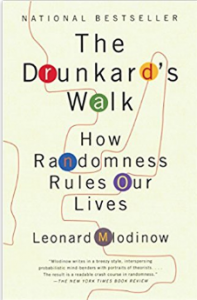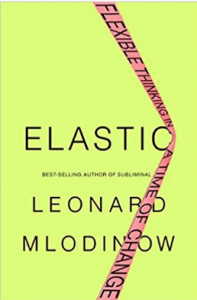I recently read “Subliminal: How Your Unconscious Mind Rules Your Behavior” by Leonard Mlodinow. Below are the quotes I found most interesting. If you like them, buy the book and then read it.
 “It can be difficult to distinguish willed, conscious behavior from that which is habitual or automatic.” (12)
“It can be difficult to distinguish willed, conscious behavior from that which is habitual or automatic.” (12)
“Research suggests that when it comes to understanding our feelings, we humans have an odd mix of low ability and high confidence.” (19)
“Research supports that “environmental factors” such as package design, package or portion size, and menu descriptions unconsciously influence us.” (20)
“Both direct, explicit aspects of life (the drink, in this case) and indirect implicit aspects (the price or brand) conspire to create our mental experience (the taste). The key word here is “create.” Our brains are not simply recording a taste or other experience, they are creating it.” (25)
“Deep concentration causes the energy consumption in your brain to go up by only about 1 percent. No matter what you are doing with your conscious mind, it is your unconscious that dominates your mental activity – and therefore uses up most of the energy consumed by the brain.” (35)
“Our unconscious doesn’t just interpret sensory data, it enhances it. It has to, because the dta our senses deliver is of rather poor quality and must be fixed up in order to be useful.” (46)
“When we are repeatedly asked to re-create a memory, we reinforce it each time, so that in a way we are remembering the memory, not the event.” (66)
“If your child’s fantasy is a ride in a hot air balloon, research has shown that it is possible to supply that memory with none of the expense or bother of arranging the actual experience.” (75)
“As humans, we are so prone to false memories that you can sometimes induce one simply by casually telling a person about an incident that didn’t really happen. Over time, that person may “remember” the incident but forget the source of that memory. As a result, he or she will confuse the imagnied event with his or her actual past.” (76)
“Whether or not we wish to, we communicate our expectations to others, and they often respond by fulfilling those expectations.” (113)
“Labeling children as gifted had proved to be a powerful self-fulfilling prophecy.” (114)
“It stands to reason that one can also adjust the impression one makes by consciously looking at or away from a conversational partner.” (122)
“One of the major factors in social success, even at an early age, is a child’s sense of nonverbal cues.” (124)
“When asked to rate men they can hear but not see, women miraculously tend to agree: men with deeper voices are rated as more attractive.” (130)
“Speakers with higher-pitched voices were judged to be less truthful, less emphatic, less potent, and more nervous than speakers with lower-pitched voices. Also, slower-talking speakers were judged to be less truthful, less persuasive, and more passive than people who spoke more quickly.” (133)
“A little speedup will make you sound smarter and more convincing.” (133)
“If two speakers utter exactly the same words but one speaks a little faster and louder and with fewer pauses and greater variation in volume, that speaker will be judged to be more energetic, knowledgeable, and intelligent. Expressive speech, with modulation in pitch and volume and with a minimum of noticeable pauses, boosts credibility and enhances the impression of intelligence.” (133)
“Though your evaluation of another person may feel rational and deliberate, it is heavily informed by automatic, unconscious processes.” (156)
“Desire for food and water is the strongest ideology.” (164)
“Your in-group identity influences the way you judge people, but it also influences the way you feel about yourself, the way you behave, and sometimes even your performance.” (170)
“We are highly invested in feeling different from one another – and superior – no matter how flimsy the grounds for our sense of superiority, and no matter how self-sabotaging that may end up being.” (174)
“Emotions, in today’s neo-Jamesian view, are like perceptions and memories – they are reconstructed from the data at hand.” (182)
“When nerve cells send a signal to the pain centers of your brain, your experience of pain can vary even if those signals don’t.” (182)
“An isolated pratfall such as the coffee-spilling incident tends to increase the likability of a generally competent-seeming person, and the anticipation of meeting an individual tends to improve your assessment of that individual’s personality.” (194)
“The “causal arrow” in human thought processes consistently tends to point from belief to evidence, not vice versa.” (201)
“Our unconscious can choose from an entire smorgasbord of interpretations to feed our conscious mind. In the end we feel we are chewing on the facts, though we’ve actually been chomping on a preferred conclusion.” (203)
“They show that when assessing emotionally relevant data, our brains automatically include our wants and dreams and desires. Our internal computations, which we believe to be objective, are not really the computations that a detached computer would make but, rather, are implicitly colored by who we are and what we are after.” (206)
“The subtlety of our reasoning mechanisms allows us to maintain our illusions of objectivity even while viewing the world through a biased lens.” (214)
“We choose the facts that we want to believe. We also choose our friends, lovers, and spouses not just because of the way we perceive them but because of the way they perceive us. Unlike phenomena in physics, in life, events can often obey one theory or another, and what actually happens can depend largely upon which theory we choose to believe.” (218)
Liked the quotes? Buy the book.



